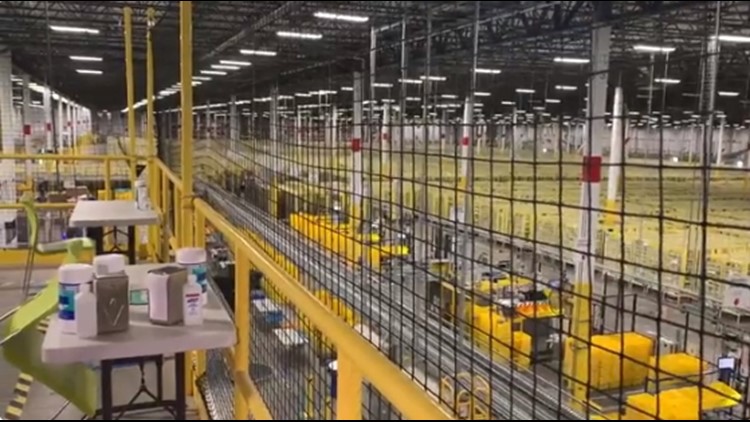HARTFORD, Conn. — Attorney General William Tong announced that Connecticut is joining the Federal Trade Commission (FTC) and 16 other states to sue Amazon. The suit alleges that the online retail giant is a "monopolist" that uses anticompetitive and unfair strategies to illegally maintain its monopoly power.
The FTC and the state attorneys general said Amazon's actions allow for it to "stop rivals and sellers from lowering prices, degrade quality for shoppers, overcharge sellers, stifle innovation, and prevent rivals from fairly competing against Amazon."
The complaint alleges that Amazon violates the law not because it's a big entity but because it engages in a "course of exclusionary conduct" that prevents competitors from growing and new competitors from emerging.
"Amazon's far-reaching schemes impact hundreds of billions of dollars in retail sales every year, touch hundreds of thousands of products sold by businesses big and small, and affect over a hundred million shoppers," a release sent by Tong's office said.
Tong said that as the technology industry grows its influence and dominance over people's lives, the public can't lose sight of the impacts on families and small businesses and that "we can't be afraid to enforce our laws and protect competition and fair markets."
He goes on to say in a statement:
For hundreds of thousands of small businesses around the country, selling on Amazon is a constant fight to keep yourself ahead while Amazon stacks the deck in its own favor with ever-increasing fees, commissions, and other charges, all designed to perpetuate its monopoly power. Like a casino, no matter what sellers do, the house—Amazon—always wins.
Amazon anticompetitive strategies, include punishing its third-party sellers and competing online retailors if they dare to undercut Amazon’s prices and forcing its third-party sellers to pay for its fulfillment network to gain prime product display and search results placement. These practices essentially thwart Amazon’s competitors from offering lower prices and better services.
In the end, it means less choice and higher prices for all of us. In coordination with the FTC and 16 other states, we’re suing today to stop Amazon from abusing its market dominance to protect fair competition for consumers and businesses alike.
The FTC and states suing allege that Amazon's anticompetitive conduct happens in two markets: The online superstore market and the market for online marketplace services purchased by sellers.
These tactics include:
Anti-discounting measures that will punish sellers and deter other online retailers from offering prices lower than Amazon. Because of this, prices are kept higher for products across the internet. The FTC and states provide an example of if Amazon discovers that a seller is offering lower-priced goods elsewhere, they can bury the seller so far down on Amazon's search results that they become effectively invisible.
Another tactic includes conditioning sellers' ability to obtain "Prime" eligibility for their products on sellers using Amazon's costly fulfillment service. The suit states that this has made it substantially more expensive for sellers on Amazon also to offer their products on other platforms.
"This unlawful coercion has, in turn, limited competitors' ability to effectively compete against Amazon," a press release issued by Tong's office states.
The release states that Amazon's exclusionary conduct makes it impossible for competitors to gain a foothold in the market, stating that it degrades the customer experience by replacing relevant, organic search results with paid advertisements and deliberately increasing junk ads, which worsen search quality.
They also allege that Amazon's search results are biased to show Amazon's own products over ones that Amazon knows are of better quality.
And lastly, they allege that Amazon charges costly fees to the hundreds of thousands of sellers who currently have no choice but to rely on Amazon to stay in business. The fees reportedly range from monthly to advertising fees that have become virtually necessary for business.
Tong said that combined, the fees force many sellers to pay close to 50% of their total revenues to Amazon, harming sellers and shoppers.
The FTC and its state partners are seeking a permanent injunction in federal court that would prohibit Amazon from engaging in this conduct and "pry loose Amazon’s monopolistic control to restore competition."
Connecticut joins Delaware, Maine, Maryland, Massachusetts, Michigan, Minnesota, New Jersey, New Hampshire, New Mexico, Nevada, New York, Oklahoma, Oregon, Pennsylvania, Rhode Island, and Wisconsin in the Commission’s lawsuit.
The Commission voted to authorize staff to file for a permanent injunction and other equitable relief in the U.S. District Court for the Western District of Washington 3-0.
Jennifer Glatz is a digital content producer at FOX61 News. She can be reached at jglatz@fox61.com.
Have a story idea or something on your mind you want to share? We want to hear from you! Email us at newstips@fox61.com
HERE ARE MORE WAYS TO GET FOX61 NEWS
Download the FOX61 News APP
iTunes: Click here to download
Google Play: Click here to download
Stream Live on ROKU: Add the channel from the ROKU store or by searching FOX61.
Steam Live on FIRE TV: Search ‘FOX61’ and click ‘Get’ to download.



